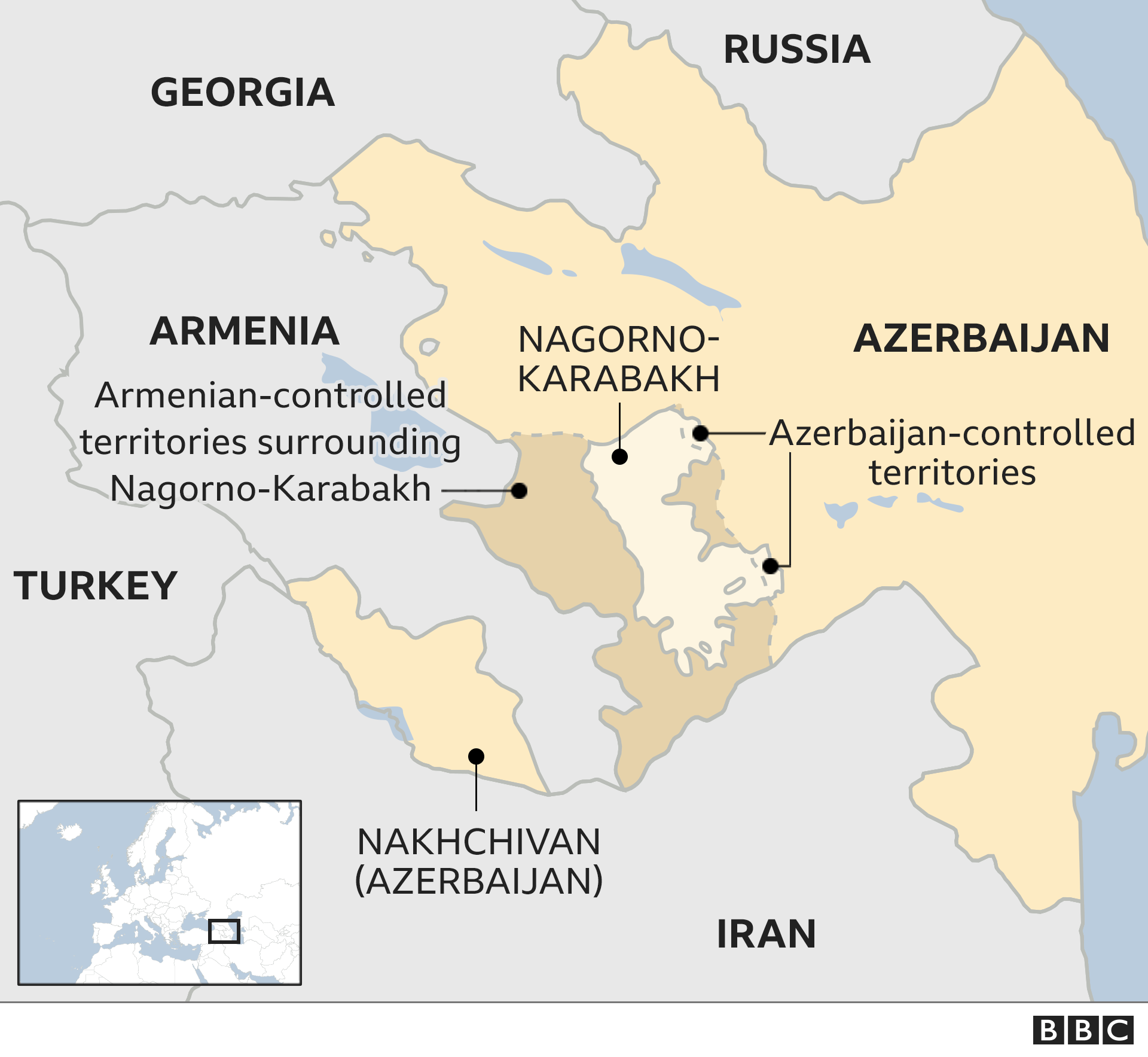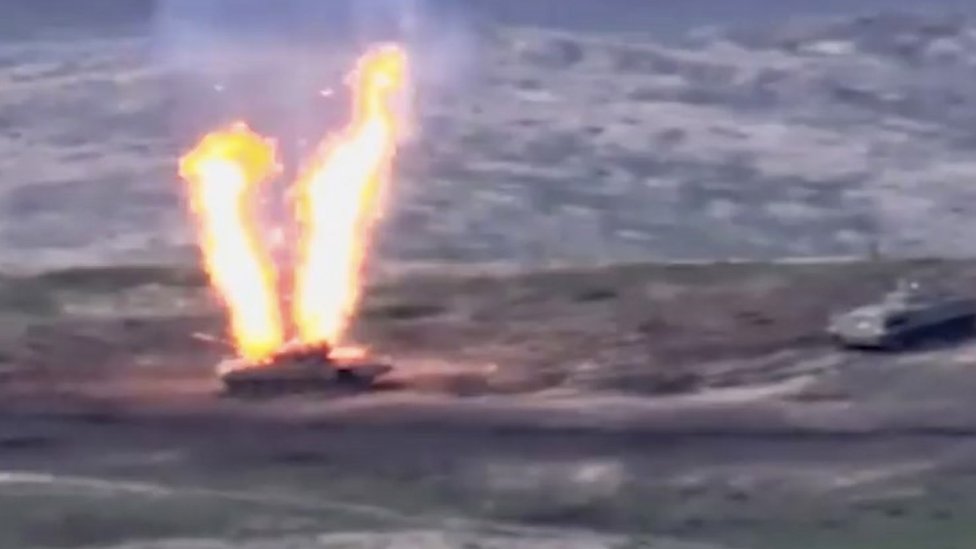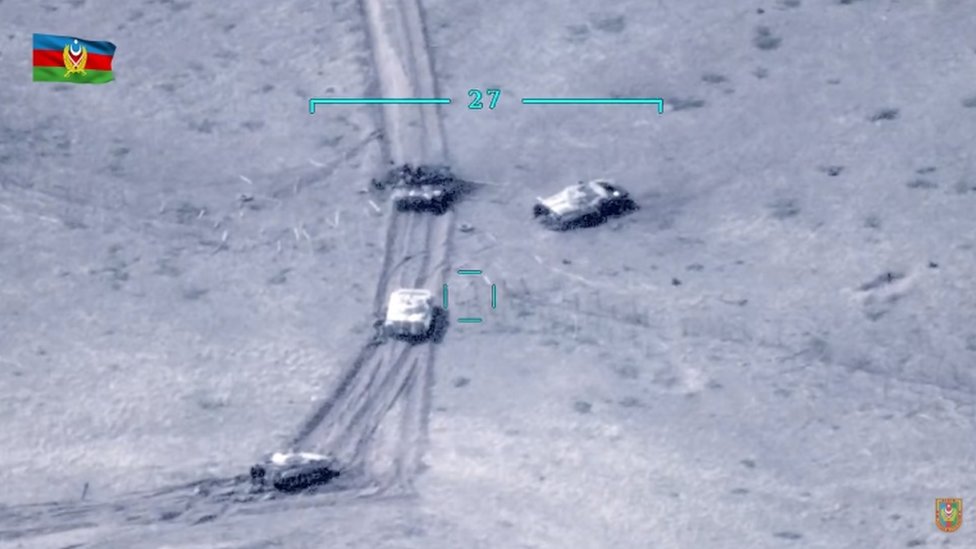The mountainous area is internationally recognised as part of Azerbaijan but is run by ethnic Armenians.
The separatist authorities there said 31 of their soldiers had now died, and some lost positions had been retaken.
Azerbaijan said its forces inflicted "heavy losses" and that Armenian shelling had injured 26 civilians.
Both Armenia and Azerbaijan have already declared general mobilisation and martial law in some areas.
The fighting is the heaviest seen in the long-running conflict since 2016, when at least 200 people were killed in clashes.
It has sparked international calls for diplomacy, amid fears that regional powers could be drawn into the conflict in the strategically important Caucasus region.
Turkey has already declared its support for Azerbaijan, while Russia - which has military bases in Armenia - called for an immediate ceasefire.
Armenia accuses Turkey of providing direct military support for Azerbaijan, a claim denied by Azerbaijan.
The territorial dispute over Nagorno-Karabakh is one of the world's oldest conflicts.

When Nagorno-Karabakh broke away from Azerbaijan in the early 1990s, tens of thousands died in fighting, and many ethnic Azerbaijanis were forced to flee their homes.
It is now a de facto independent region, relying heavily on support from Armenia. But it is not recognised by any UN member, including Armenia.

Nagorno-Karabakh - key facts
- A mountainous region of about 4,400 sq km (1,700 sq miles)
- Traditionally inhabited by Christian Armenians and Muslim Turks
- In Soviet times, it became an autonomous region within the republic of Azerbaijan
- Internationally recognised as part of Azerbaijan, but majority of population is ethnic Armenian
- An estimated one million people displaced by 1990s war, and about 30,000 killed
- Separatist forces captured some extra territory around the enclave in Azerbaijan in the 1990s war
- Stalemate has largely prevailed since a 1994 ceasefire
- Turkey openly supports Azerbaijan
- Russia has military bases in Armenia

What's the latest from the battlefield?
On Monday, authorities in Nagorno-Karabakh said another 15 of their soldiers had been killed. They had reported 16 fatalities among the military on Sunday.
More than 100 people have been wounded.

The self-proclaimed republic said its forces had destroyed four Azeri helicopters, 36 tanks and armoured personnel vehicles, according to the Armenpress news agency.
It also said it had killed many Azerbaijani troops.
Armenian defence ministry spokeswoman Shushan Stepanyan said that "fights of various intensity are raging on", adding that "defence army units" were carrying out "counter actions" in several areas.

Azerbaijan's defence ministry said the country's forces continued "the counter-attack", moving from "advantageous positions liberated from the Armenian armed forces".
It said that "the enemy suffered heavy losses".
Azerbaijan earlier confirmed the loss of one helicopter but said the crew had survived, and reported that 12 Armenian air defence systems had been destroyed. It denied other losses.
Azerbaijan on Monday said 26 civilians were injured in Armenian shelling, accusing Armenia of targeting densely populated areas.
Azerbaijan said five members of the same family had been killed by Armenian shelling on Sunday.
The casualty claims made by Armenia and Azerbaijan have not been independently verified.
The international reaction
- UN Secretary-General Antonio Guterres said he was "extremely concerned", urging both sides to stop fighting
- Russia's foreign minister held urgent talks both with the Armenian and Azeri leadership
- France, which has a large Armenian community, called for an immediate ceasefire and dialogue
- Iran, which borders both Azerbaijan and Armenia, offered to broker peace talks
- President Donald Trump said the US was seeking to stop the violence
What's the background?
In 1988, towards the end of Soviet rule, Azerbaijani troops and Armenian secessionists began a bloody war which left Nagorno-Karabakh in the hands of ethnic Armenians when a truce was signed in 1994.
Swathes of Azeri territory around the enclave are also under Armenian control.
Negotiations have so far failed to produce a permanent peace agreement, and the dispute in the region remains one of post-Soviet Europe's "frozen conflicts."
Karabakh is the Russian rendering of an Azeri word meaning "black garden", while Nagorno is a Russian word meaning "mountainous". Ethnic Armenians prefer to call the region Artsakh, an ancient Armenian name for the area.
Over the years both sides have had soldiers killed in sporadic breaches of the ceasefire. Landlocked Armenia has suffered severe economic problems due to the closure of borders with Turkey and Azerbaijan.
Russia, France and the US co-chair the Organization for Security and Co-operation in Europe's Minsk Group, which has been attempting to broker an end to the dispute.
World - Latest - Google News
September 28, 2020 at 07:26PM
https://ift.tt/33aMRfk
Nagorno-Karabakh: Armenia-Azerbaijan fighting rages in disputed region - BBC News
World - Latest - Google News
https://ift.tt/2SeTG7d
https://ift.tt/35oCZy1
Bagikan Berita Ini














0 Response to "Nagorno-Karabakh: Armenia-Azerbaijan fighting rages in disputed region - BBC News"
Post a Comment